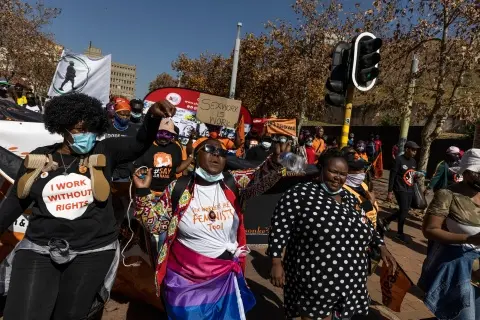South Africa Court to Rule on Constitutionality of Criminalizing Sex Work
By: Stacey-Leigh Manuel | Deputy Director, Women’s Rights Division
By: Heather Barr | Associate Director, Women’s Rights Division
Photo: Sex workers and supporters attend a march calling for decriminalization of sex work in Johannesburg, South Africa, May 27, 2021. © 2021 GUILLEM SARTORIO/AFP via Getty Images
In a landmark case set to take place at the Western Cape High Court in South Africa at the beginning of September, the issue of criminalizing sex work will be put under the spotlight. This case has the potential to bring an end to the criminalization of sex work in the country, a move that has been long-awaited and could significantly impact the safety, dignity, and equality of sex workers.
Human Rights Watch and Amnesty International have joined the case as friends of the court, highlighting the clear evidence both in South Africa and globally that criminalizing sex work does not improve safety or prevent human trafficking. In fact, it pushes sex workers into hidden and unsafe environments where they are vulnerable to violence and abuse, often without any recourse for protection.
It is crucial to differentiate between sex work and trafficking for sexual exploitation, as conflating the two results in laws and policies that fail to protect both sex workers and trafficking survivors. Decriminalizing sex work in South Africa has the potential to provide numerous benefits, including easier access to support for trafficking survivors, the ability for sex workers to collaborate and protect themselves, and improved access to healthcare services, including HIV prevention and treatment.
Opponents of decriminalization often argue that criminalization is necessary to combat trafficking. However, extensive evidence over the years has shown that punitive laws only drive sex work further underground, making it harder to detect and prosecute trafficking. Decriminalization, alongside robust anti-trafficking measures, is the most effective way to safeguard the rights of all individuals involved.
This case is not just about changing laws in South Africa; it is about recognizing sex workers as legitimate workers entitled to the same rights and protections as any other individual. It is a matter of dignity, equality, and bodily autonomy. As the hearings approach, it is essential for the public, civil society, and policymakers to raise their voices, share the message, and demand change.
Join the conversation and stand in solidarity with sex workers and survivor advocates. Let’s work together towards ending the unjust criminalization of consensual adult sex work in South Africa.
Hearings: 1–2 September 2025
Hashtags: #DecrimSexWork #DecrimInCourt








